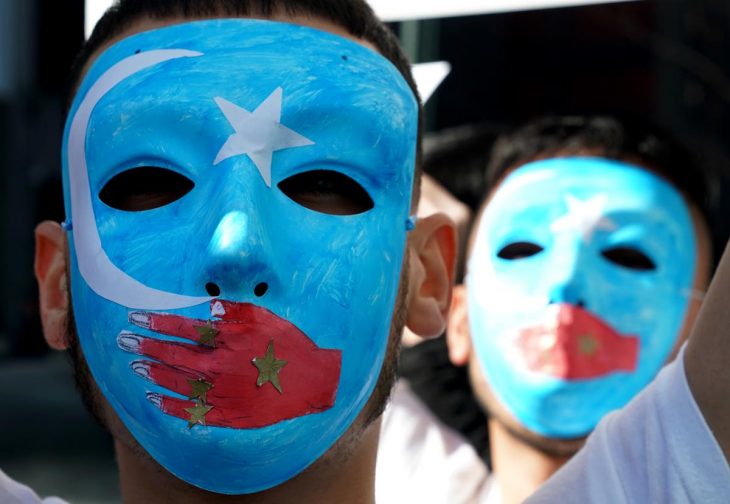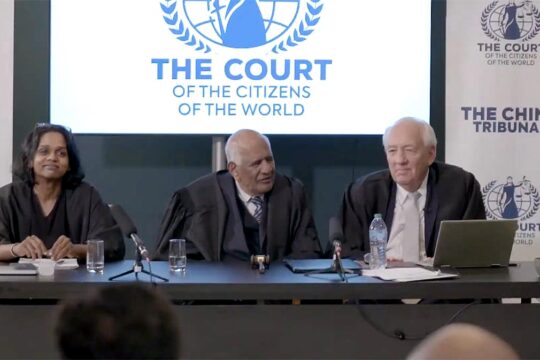On March 19, the UN Human Rights Council (HRC) in Geneva held a general debate on racism. This was one of the items on the agenda of its 40th session, and it was the turn of NGOs to speak. Director of UN Watch Hillel Neuer spoke up on behalf of a partner association, Ingénieurs du monde (Engineers of the World). His aim was to denounce the repression conducted against China’s Muslim minorities (Uyghurs, Kazakhs and Turkmens) in the autonomous Chinese region of Xinjiang as well as the Organisation of Islamic Cooperation’s silence or even praise for the Chinese authorities.
Banging on the table, the Chinese government representative interrupted the speaker immediately, saying this meeting on racism in the world was not the place to talk about a specific case in a country. Her objection was overridden by the president of the Human Rights Council who let the NGO speak again. But the diplomat continued to interrupt noisily, repeating the same argument. This brought a call to order by the president, Coly Seck of Senegal, reminding China’s representative that speakers may refer to specific situations and asking her not to disturb the discussions.
VIDEO
General debate on racism during the 40th ordinary session of the UN Human Rights Council
This was the latest clear sign of the strategy adopted in Geneva by the Chinese delegation, which came in force for the main annual session of the HRC. Beijing deploys a whole panoply of strategies aimed at keeping its abuses away from the spotlight in international forums: mobilisation of friendly countries to praise the regime, pressure on other diplomats not to take part in meetings criticizing massive rights violations in China, interventions by NGOs under Beijing’s thumb. An exhibition vaunting great development of human rights in Xinjiang was even organized on the sidelines by the Chinese mission in Geneva and the China society for human rights studies.
Strike force
"I have been following the work of the UN human rights bodies since 1980 and I have never seen at the Palais des Nations such a strike force deployed by a state to stifle criticism," said Adrien-Claude Zoller, director of Geneva for Human Rights, a non-governmental organization that provides training for civil society.
John Fisher, the Geneva representative of Human Rights Watch, echoed Zoller’s words: "I have never seen such strong pressure and intimidation on diplomats and NGOs from a government at the Human Rights Council.”
The American NGO denounced such practices back in 2017, but that has not stopped them at all. John Fisher gave another example from a meeting organized on the sidelines of the session by several countries including the United States. Following a damning testimony by Omir Bekali, a Kazakh who was detained for several months in Xinjiang, “a Chinese representative intervened calling him a liar, and mentioning personal information about him. If that is not intimidation and veiled threats, I don’t know what is,” said Fisher.
Fear of a commission of inquiry
Zoller thinks the Chinese delegation's restlessness was probably linked to fears of a resolution being tabled at the human rights council to establish a commission of inquiry into alleged human rights violations in Xinjiang. This had been called for by a broad coalition of NGOs before the March HRC session. In a statement in February, the coalition urged the Council to “urgently adopt a resolution establishing an international fact-finding mission to investigate credible allegations that up to one million Turkic Muslims are being arbitrarily detained in `political education` camps across Xinjiang, a region in northwest China”.
This possibility has been cautiously evoked by Michelle Bachelet, High Commissioner for Human Rights. The former president of Chile said she wanted to continue the discussion with the Chinese government to allow "an independent assessment of allegations of enforced disappearances and arbitrary detentions, particularly in the Xinjiang Uyghur Autonomous Region".
Despite the blanket of silence imposed on Xinjiang since the riots that shook the autonomous region in 2009, the existence of large internment camps where an estimated one million Kazakhs, Turkmens and Uyghurs of the Muslim faith are reportedly detained is increasingly documented. Last September, the Committee on the Elimination of Racial Discrimination published a report in which it expressed alarm at “numerous reports of the detention of large numbers of ethnic Uyghurs and other Muslim minorities, held incommunicado and often for long periods, without being charged or tried, under the pretext of countering religious extremism. The Committee regrets the lack of official data on how many people are in long-term detention or who have been forced to spend varying periods in political `re-education camps` for even non-threatening expressions of Muslim ethno-religious culture, such as a daily greeting. Estimates of the number of people detained range from tens of thousands to over a million.”
After first denying the existence of such camps, the Chinese government now says they are training and de-radicalization centres. In Geneva, Chinese vice foreign minister Le Yucheng continued to denounce as lies reports of abuses committed in these camps. “Terrorist attacks and other troubling acts have been committed in this region,” he said. “With the support of the population, measures have been taken, notably the creation of these training centres which are not internment camps.” The Chinese delegation invited "anyone who wishes to visit Xinjiang to do so, provided they are honest and respect China's sovereignty”.
Turkey expresses concern
The Muslim countries had nothing to say, except for Turkey. The Turkish foreign minister Mevlüt Çavuşoğlu briefly declared in Geneva that the Rohingya crisis remained a situation of serious concern and also China’s treatment of Uyghurs. The Chinese delegation predictably replied that this statement was “baseless and unacceptable”.
A month earlier, a Turkish official had been more explicit. “It is no secret that more than a million Uyghurs facing arbitrary detention are being subjected to torture and brainwashing in internment camps and prisons,” declared Turkish foreign ministry spokesman Hami Aksoy. He called this a “shame on humanity” and urged the UN to “put an end to the human tragedy taking place in Xinjiang”.
Pakistan, speaking in Geneva on behalf of the OIC, did not express any concern. It even praised China for the care it takes of its Muslim citizens. During a press conference at the Palais des Nations on February 27, the Pakistani Minister for Human Rights tried to justify this position. According to Shireen Mazari, abuses committed against Muslim minorities in Xinjiang are essentially allegations by Westerners. Her government, she said, prefers to discuss these issues on a one-to-one basis as part of its cooperation with its Chinese counterparts.
As a result, no resolution on China was finally tabled at the end of this session of the Human Rights Council. However, such a resolution, or even a simple declaration by States, is one of the essential steps to set in motion UN mechanisms for collecting evidence, according to John Fisher. This was clearly easier in the case of Myanmar, for which the HRC voted last September to create an investigation mechanism.






